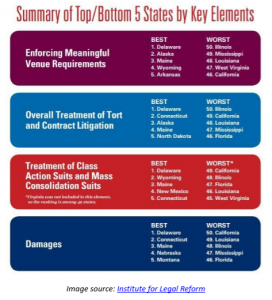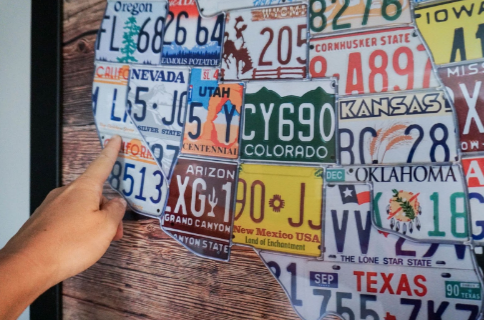If you live in any of the aforementioned states, then you have all the reasons to register your business in your home state. But can you live in one state and have a business in another? The short answer is yes, you can. There are times when it makes more sense to register your business in a different state from where you live.
For example, if you’re starting a business with limited finances, you can consider registering it in a state that offers low fees, low taxes and other financial incentives. This would work well in the short and long terms if that state’s tax, fees and financial requirements are more favourable than your state’s.
And, it goes without saying that there’s always a state that fits your business needs. Almost all states actively compete to attract new business formations. For that reason, they will offer incentives in one form or another. This competition makes some states attractive in one area and others in other areas. For example, Wyoming is excellent if you want to pay the least taxes but Delaware has the better court system.
What Is The Best State To Register A Business?
The single best state to register a business in is Delaware. The First State tops the charts because of its business-friendly laws, excellent court system, low tax rates and protection for business owners.If, however, you need a longer list of the best states to start a business, then the top 10 also include Wyoming, Nevada, South Dakota, Florida, Alaska, Montana, New Hampshire, Utah and Indiana.
Let’s have a keener look at the top 3 best states to start a business:
1. Delaware
Delaware is home to over 1,000,000 business entities. In fact, over 66% of the Fortune 500 companies are based in Delaware. It’s by far the most popular and best state to register a small business, LLC or big corporation. And rightfully so because The First State offers lots of incentives that a business can take advantage of.
One of the biggest incentives is that Delaware has a special, savvy court for handling business matters, which expedites business cases. The court is called the Chancery Court and is made up of judges who are experienced in business matters. As such, businesses almost always get fair outcomes in cases. And that’s why Delaware consistently ranks top in lawsuit climate surveys.

Why Delaware Is The Best State To Register A Business In
- Delaware has an excellent court system for businesses. It has a solid reputation for upholding legal fairness.
- The state offers a speedy filing process for new businesses.
- The filing fee is a mere $90 for an LLC. This makes Delaware one of the cheapest states to start a business in.
- As a business owner, you get increased liability and privacy protection in Delaware.
- You are allowed to operate a business alone in Delaware. Most other states require at least three people to be directors.
- Delaware has attractive tax incentives. There’s no VAT, no tax on business transactions, and no tax on the transfer of capital stock. Besides, you won’t have to pay state income tax if you register your business in Delaware and have its headquarters in a different state. You won’t have to pay tax on inventory either.
The Downside Of Incorporating A Business In Delaware
The biggest drawback of registering a business in Delaware is that it’s mostly ideal for big and established corporations. For example, the state requires an annual report which costs $300. This is on the higher end and new startups may not always have a budget for it. If you’re a new business, you may find it increasingly hard to take advantage of all the benefits of incorporating in Delaware.
2. Wyoming
Wyoming is by far the best state to start a business for tax purposes. It neither charges corporate nor personal income tax. The 4% sales tax is pretty low as well; the sixth lowest in the US. Besides, the filing fee is a mere $100 and the annual report costs just $50. Combined, these factors make Wyoming the best state to register a small business that’s keen on saving costs.
But there’s more. The state’s business-friendly legal system offers the strongest asset protection laws of any state in America. It does so with the least amount of corporate red tape. For example, you’re allowed to handle the registration process entirely online. This is excellent because you don’t have to set foot in Wyoming to open a business in the state. For that reason, it’s the best state to form an LLC for an online business or to incorporate any online business.
Benefits Of Incorporating A Business In Wyoming
- Wyoming has low registration fees and attractive tax benefits
- The state has strong asset protection laws for business owners
- LLC assets are also protected against personal liabilities
- You can handle the entire registration process online
- Wyoming allows you to run your business without listing members or managers with the state. This is great for privacy.
The Downside Of Incorporating A Business In Wyoming
It may be the cheapest LLC state but Wyoming still presents a few challenges to keep in mind. For one, only people who own businesses and live in the state are entitled to the lowest tax benefits. If you remotely incorporate a business in Wyoming, then most likely you won’t enjoy any cost-saving benefits. Plus, Wyoming’s property tax remains high.
3. Nevada
In some aspects, Nevada easily ranks as the best state to start a business for tax purposes. With no personal income tax, corporate income tax and franchise taxes, the state offers exceptional tax benefits. And you don’t have to share the identities of members and managers with the state. That’s all down to Nevada’s LLC Act, which completely cuts sharing of such information with the IRS. For that reason, you get to enjoy lots of privacy while running your Nevada-based business.
More to the legal point, Nevada allows you to run your business without holding annual meetings. You don’t even have to create an operating agreement. That’s excellent news, especially if you’re looking for a state where you can incorporate and run a business with few corporate red tapes.
Benefits Of Incorporating A Business In Nevada
- Nevada offers attractive tax benefits for new and existing businesses
- The state doesn’t mandate an operating agreement
- You don’t need to file identities of members and managers
- Strong protective laws for personal as well as LLC assets
- Nevada allows out-of-state entrepreneurs to enjoy the same tax benefits as local entrepreneurs
The Downside Of Incorporating A Business In Nevada
Great as it is for taxes, Nevada is not business-friendly as far as business fees. You’ll have to pay a filing fee of $425 and additional annual costs of $350 per year. These are pretty high, particularly for small businesses.
Worst States To Start A Business
So far, we’ve looked at the best states to start a business. On the other end of the spectrum are the worst states to start a business. This list is topped by New Jersey, California and Hawaii.
Alongside having less-than-reliable business laws, these states are too expensive when it comes to incorporating and running a business. But they are not the only ones. Completing the top 10 are New York, Connecticut, Minnesota, Arkansas, Maryland, Vermont and Louisiana.
Below is a look at why New Jersey, California, and Hawaii are the worst states to start a business.
New Jersey
New Jersey consistently appears among the worst states to start a business in because of its unfavourable business taxes. In fact, DC-based think tank, Tax Foundation, ranks New Jersey as the worst state on account of “complex, nonneutral taxes with comparatively high rates”.
On the one hand, the Garden State has an impressive pool of productive and well-educated workforce. That’s essential because businesses need skilled labour in their initial and growth phases. On the other hand, attracting New Jersey’s labour force is a very expensive affair that small businesses often can’t afford.
At $12, the state’s minimum wage is up there with the highest rates. For context, California’s minimum wage of $14 is the highest in the country while Alabama’s $7.25 is the lowest. Judging by the trend in the past decade or so, New Jersey’s minimum wage will only increase each year, pushing the state’s workforce beyond the reach of new and small businesses.
To top it all off, in 2020, the Garden State introduced mandated paid sick leave for employees and their extended families. Therefore, if New Jersey’s high taxes don’t choke your business to death, its costly workforce will.
California
Three things make California one of the worst states to start a business. The first is its high taxes. The Small Business & Enterprise Council (SBEC) ranks the Golden State 49th (out of 50) in taxation.
Secondly, pretty much everything in California is expensive. From gas to the cost of credit and everything in between (California ranks 50th in cost of living and 49th in housing affordability). This, in turn, makes the cost of running a business in California very high.
Finally, the Golden State doesn’t have nearly as good business laws as Delaware, Wyoming and Nevada.
On the upside, getting venture capital in California is easier than in most other states across the country. Thus, if you can crack it here, you’ll have hit gold as far as starting your business and setting it up for success.
Hawaii
Despite the nickname “Paradise of the Pacific”, there are not many paradisiacal things about Hawaii as far as starting a new business. The tax rate in the Aloha state is nearly twice as much as most of continental US. The cost of doing business is as high as California while getting skilled labour is an uphill task.
To compound the problem, Hawaii introduced new regulations for businesses in 2020. One of them is that restaurants now have to provide water, white milk or juice as children’s beverages. And no business is allowed to use plastic bags.
They may seem minor, but these regulations ultimately make it that bit harder to start and run a successful business. That’s especially the case if you’re in the restaurant business.
Can I Live In One State And Have A Business In Another?
Yes, you can. All states allow you to incorporate a business regardless of where you live. However, some states don’t offer benefits that make it worthy to ditch your home state.
Wyoming is a good example. Most of the tax and cost-saving benefits that make it attractive are meant for entrepreneurs who choose to live in the state. If you have a business in Wyoming but live out of state, then you won’t be entitled to a low tax setup.
The Case For Your Home State
Oftentimes the best state to register a small business is in your home state. The likes of Delaware, Wyoming and Nevada are appealing for many reasons. However, your home state stands to offer unique benefits that may cancel out the need to look for a state with lower taxes or a better court system.
For example, it’s typically cheaper to file in your home state than to file in another state and then come back to register the same business as a foreign LLC in your home state. In the latter case, it means that you’ll go through the registration process twice; firstly, in the foreign state and secondly, in your local state. In addition to taking more time, double registration will prove costlier in terms of fees and paperwork.
If you’re incorporating a small business that needs hands-on attention (like a restaurant or retail outlet), then you’ll certainly want to register it in the state where you live. At the very least, the business location should be somewhere you can easily access.
Conclusion
Regardless of your preferred location, Nearside puts business checking at your fingertips. Get a modern checking account for small businesses with no NSF fees and no minimum deposit requirements for a business opened in any state in the US.











